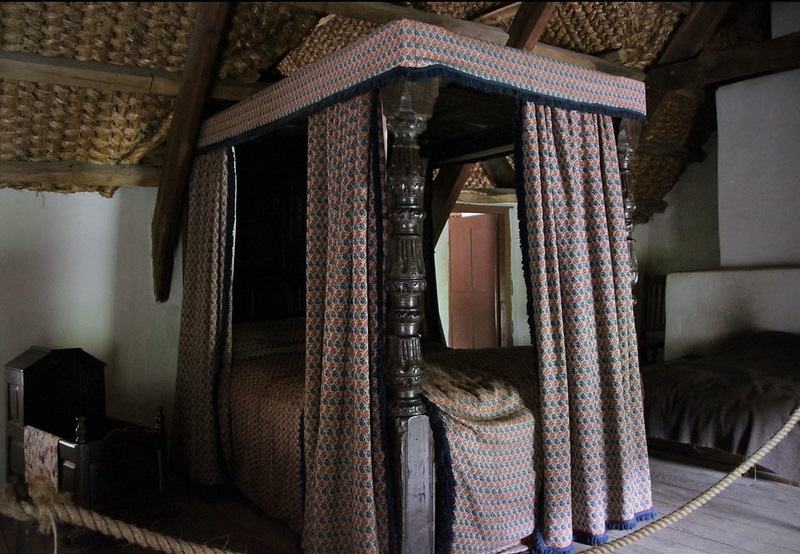‘Two sleeps’ and devotional practices: a look at how Welsh people slept in the 17th century

Dewi Alter, Lecturer in the Literature, Theory and Creativity Research Unit, Cardiff University
While sleep is a universal human experience, the way we do so has varied greatly across cultures, social classes and even time periods.
A 17th-century vicar’s poetry offers a surprising window into how people in Wales got their nightly rest.
Born around 1579, Rhys Prichard began serving his hometown of Llandovery, Carmarthenshire, as a vicar in 1602. His verses, rich with details about nighttime experiences, offer fascinating clues about how people back then approached their sleep.
Much of our historical understanding of sleep comes from medical texts or social commentaries. But Prichard’s poetry provides a more personal and intimate perspective, revealing not just the “how” but also the “why” behind 17th-century sleep habits.
Canwyll y Cymru
The vicar’s poetry, written in the Welsh language, may have also served as a tool to spread the ideas of the Protestant Reformation in Wales. His poems are collected in a publication called Canwyll y Cymru (the Welsh people’s candle), which was published as a complete collection in 1681 after his death in 1644. The title comes from one of his poems where he writes that he hopes his work can provide light to the Welsh people showing them how to serve God.
Canwyll y Cymru was very popular and was regularly reprinted until the end of the 19th century. It was common to find the collection in homes throughout Wales. Part of its appeal, no doubt, was that the poems have a homely feel and deal with aspects of everyday life. They were also easy to understand and even easier to remember.
The vicar wrote several poems about sleep that depict how people slept and how he thought they should prepare for bed. Sleep was an intensely religious and spiritual experience, with prayers being offered for the gift from God of a good and safe night’s sleep. There are requests for God to place the believer into his care.
It was common in early modern England to create a barricade and block all entrances when going to sleep. Although there is no reference to that in Prichard’s poems, the readers are encouraged to shut their doors.
His sleep poems also display some of his central themes. They include the need to depend on God and to worship him, and how human beings are completely lost without him. His poems emphasise the significance of Christ’s death on the cross and they draw heavily on the Bible.
Two sleeps
Studies of night-time have drawn attention to a phenomenon called “two sleeps”, or “biphasic” sleep. Before mass industrialisation it appears it was common – at least in the west – to have a period of wakefulness during the middle of the night for an hour or two, and complete a variety of tasks.

This phenomenon is attested to in the verse Myfyrdod pan dihuner o gysgu ganol nos (A meditation when you wake from sleep in the middle of the night). In it Prichard shows that this period of wakefulness is an excellent opportunity to meditate on the glory of God and to praise him, calling it a wonderful thing to do, especially because he says, God always protects us.
The vicar’s audience are encouraged to emulate the biblical King David who, according to Psalm 119:62, rose at midnight to give thanks to God. The vicar’s audience are told to rise at night in a similar manner.
Prayer is a recurring topic throughout his poetry, including his sleep poems. Readers are provided with numerous verses of prayer which encourage his audience to praise God, to repent of their sins and to ask for his care, such as in Gweddi wrth fynd ir gwely (A bedtime prayer).
Death
Sleep and death went hand in hand during this period and it was well known that many people went to sleep without waking again. The vicar tells his readers to think of death while looking at their beds. The fear of death at night explains, in part, why the vicar recommends repenting of sins.
According to his verses, the devil was always awake and, like a lion, wanted to take people at night and devour them. It is not surprising, then, that several of the vicar’s poems ask for God’s protection and for him to quell anxieties, providing people with a good night’s sleep.
After all, going to sleep was a leap of faith, a sure sign of human weakness and necessitated divine protection. In the vicar’s poems a good and a safe night’s sleep was a gift from God. After waking up alive and well, he encourages his readers to thank God.
Prichard’s poems are not well known anymore. But they remain relevant as they are chiefly about real people who have their own problems and concerns, including how to get a decent night’s sleep. Although sleeping practices have changed since then, the vicar’s poetry provides us with a glimpse into the ways in which some people sought a good night’s sleep.
Restlessness at night has a long and storied past. Perhaps this knowledge can offer a sliver of comfort for those of us who wake at night. And more importantly, Prichard’s verses remind us to cherish a good night’s sleep – a timeless treasure across cultures and centuries.
This article was first published on The Conversation
![]()
Support our Nation today
For the price of a cup of coffee a month you can help us create an independent, not-for-profit, national news service for the people of Wales, by the people of Wales.





There were no “Welsh” people in the 17th century. The term has only ever been used en masse by those of Wales post 1800s. The correct terms would Be Cymric or Britons.